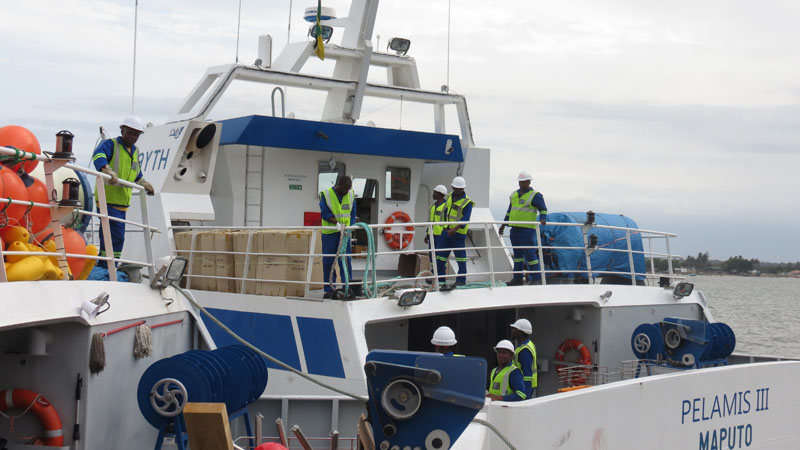Ematum revisited as the tide is about to turn

Credit rating agencies are punishing Mozambique for its attempts to renegotiate the US$850 million bond issued in 2013 by the Mozambique Tuna Company (EMATUM), and guaranteed by the government of the time.
The current Finance Minister, Adriano Maleiane, inherited the EMATUM bond from his predecessor, Manuel Chang, and realized that the terms of the bond were exorbitant and represented a heavy burden on the Mozambican Treasury.
Far from becoming a viable company, as promised in 2013, EMATUM is virtually bankrupt. Maleiane divided the bond into US$350 million for the fishing assets, which EMATUM was to repay, while the Mozambican state would shoulder the other US$500 million, supposedly to cover defence ministry assets that were also purchased with the money.
But EMATUM’s financial situation is so dire that it cannot pay anything at all, leaving the government to shoulder the entire burden of paying the interest and capital on the bond.
Under the original terms of the EMATUM bond, the money must be repaid in seven years with a two year grace period, and at the extremely high interest rate of LIBOR (London Inter-Bank Offered Rate) plus 6.5 per cent. Last year Finance Minister Adriano Maleiane announced the government’s intention to try to renegotiate the terms of the loan – he was aiming for an increased repayment time, and a lower interest rate.
The latest government suggestion is to replace the current six monthly repayments with a lump sum, covering both interest and capital, payable in 2023.
Six monthly instalments are a heavy burden for the Mozambican economy in its current state – but by 2023 income should be flowing into the state coffers from the Liquefied Natural Gas (LNG) projects in the Rovuma Basin in the far north. The predicted gas bonanza is thus expected to allow Mozambique to meet its Ematum commitments.
So the Ematum debt titles would be swapped for government debt titles for exactly the same value, but with an extra three years to pay. If the bondholders accept this proposal, it would end the enormous pressure which the regular Ematum repayments are putting on the treasury. The foreign currency currently going to the bondholders could then be used for more productive purposes.
The Standard and Poor’s rating agency, however, is now threatening to downgrade Mozambique to SD (Selective Default). A release from S&P on Wednesday warned that the exchange offered by the government would be “tantamount to default, according to our criteria”.
S&P’s immediate move was rather less drastic – “we are lowering our long- and short-term foreign currency ratings on Mozambique to ‘CC/C’ from ‘B-/B’. The local currency ratings were affirmed at ‘B-/B’”. According to the Bloomberg news agency, CC is regarded as “10 levels below investment grade”.
The S&P release insisted that the original terms of the bond constitute “a financial obligation of the government”. If the swap offered by the government means that the investors will receive less value that the promise of the original securities, then the ratings agency would regard Mozambique as in default,.
“Some details of the restructuring offer – in particular the coupon rate – have not been set yet”, S&P adds. “We note that investors who do not accept the offer by an early consent deadline may get a lower exchange ratio. The downgrade reflects our expectation that, even though investors may technically accept the offer voluntarily, Mozambique’s exchange offer will fulfil the above conditions for Standard & Poor’s to consider the exchange as tantamount to default”.
A second ratings agency, Moody’s, has acted in similar fashion, downgrading Mozambique to B3 from B2. Moody’s also downgraded the Ematum loan participation notes themselves from B2 to Caa2, with a warning that the rating “remains on review for further downgrade”.
The downgrade, Moody’s said, reflects its view that the bond exchange offered by the government “will constitute a distressed exchange leading to an economic loss relative to the original promise under the terms of the existing notes”.
Moody’s added that it would “consider a further downgrade of the rating if it were to conclude that the economic loss for investors participating to the exchange is higher than currently estimated. Conversely, Moody’s could upgrade the rating if the economic loss is lower”.
Maleiane led a delegation to London and New York earlier this week in an attempt to persuade bondholders to back the swap. According to Bloomberg, the main holders of the EMATUM securities include AllianceBernstein LP, Danske Bank A/S, Franklin Templeton Investments, Goldman Sachs Group Inc., and Aberdeen Asset Management Plc.
From a Mozambican viewpoint, the main problem with the EMATUM bond is that it remains entirely unclear where the US$850 million went.
The declared purpose of the money was to pay for 24 tuna fishing boats and six coastal defence vessels built in a shipyard in the French port of Cherbourg.
However, according to the data published in the French press at the time, the cost of the boats was around 200 million Euros, which is about 230 million dollars. Asked what the remaining 620 million dollars was for, the then Fisheries Minister, Victor Borges, told the Mozambican parliament in December 2013 it would cover such items as training, radars, satellite communications and onshore installations, but no itemized breakdown of these costs has ever been provided.






Leave a Reply
Be the First to Comment!
You must be logged in to post a comment.
You must be logged in to post a comment.